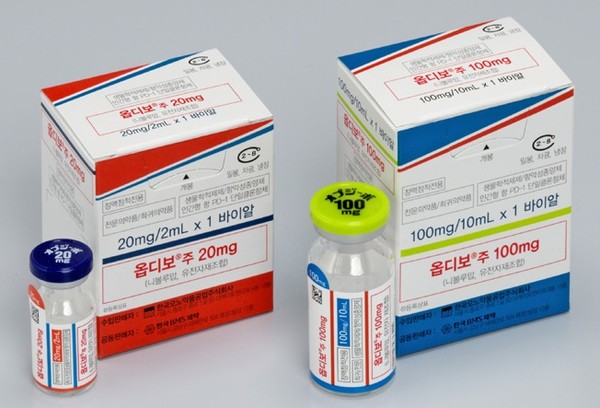Opdivo (nivolumab), anti-PD-1 immunotherapy co-developed by Ono Pharmaceutical and BMS, has taken its first step as a complete recovery partner for early non-small cell lung cancer (NSCLC) patients in Korea.
Last Wednesday, the Ministry of Food and Drug Safety approved the combined administration of platinum-based chemotherapy and Opdivo as neoadjuvant therapy before surgery in NSCLC patients with tumors that can be resected (tumor size greater than four centimeters or benign lymph nodes).

Opdivo is the first immune-cancer drug that has won approval as adjuvant therapy for resectable early-phase lung cancer patients.
Imfinzi (dervalumab) is used as a consolidation method in patients with unresectable, locally progressive NSCLC patients. However, it is a treatment to reduce the risk of recurrence in patients with no disease progression after platinum-based simultaneous chemo-radiotherapy. Therefore, Opdivo is the only immunotherapy applicable to operable patients so far.
The ministry’s approval was based on the research results of Opdivo’s phase 3 clinical trials, CheckMate-816 (ONO-4538-55). As a result of comparing the Opdivo-chemotherapy combination as neoadjuvant therapy of resectable NSCLC patients with chemotherapy alone, the Opdivo-chemotherapy group showed statistically significant improvement in event-free survival (EFS) and pathological complete response (PCR).
The primary evaluation variables were the EFS and PCR, rated by the Blind Independent Central Review committee. The secondary assessment variables were the overall survival period (OS), major pathological response (MPR), and the period before death or distant metastasis.
As a result of interim analysis, the median event-free survival (mEFS) of the Opdivo-chemotherapy group was 31.6 months, 37 percent lower than the 20.8 months of the chemotherapy group. PCR was 24 percent in the combination therapy group and 2.2 percent in the single therapy group. Such treatment effectiveness also showed consistent results in most sub-groups.
To sum up, adding Opdivo to the current standard therapy as neoadjuvant therapy has improved EFS and PCR without increased side effects or deterring operational possibilities.
Starting with Opdivo, the use of immuno-cancer drugs is expected to expand gradually in early NSCLC patients.
Early this year, Roche announced that it would win domestic approval for using Tecentriq (atezolizumab) and platinum-based chemotherapy as adjuvant therapy in 2-3A phase NSCLC patients with 1 percent or higher PD-L1 expression rate.
MSD has recently proven effects in reducing recurrence and death risks in a broader range of patients in phase 3 clinical trial of Keytruda (pembrolizumab), indicating it would expand indications for early-phase lung cancer.
According to the interim analysis results of the phase 3 trial, called PEARLS/KEYNOTE-091, Keytruda reduced recurrence and death risks by 24 percent compared to the placebo group during the follow-up monitoring period of 35.6 months as the post-operation adjuvant therapy in 1B-3A phase NSCLC patients regardless of PD-L1 expression rate and whether or not researchers combined it with existing chemotherapy.
In June, MSD applied to the U.S. Food and Drug Administration to expand Keytruda’s indications as early lung cancer treatment based on such study results. The FDA will likely decide its approval next January, heralding a free-for-all in the immuno-cancer treatments to completely cure lung cancer next year.

